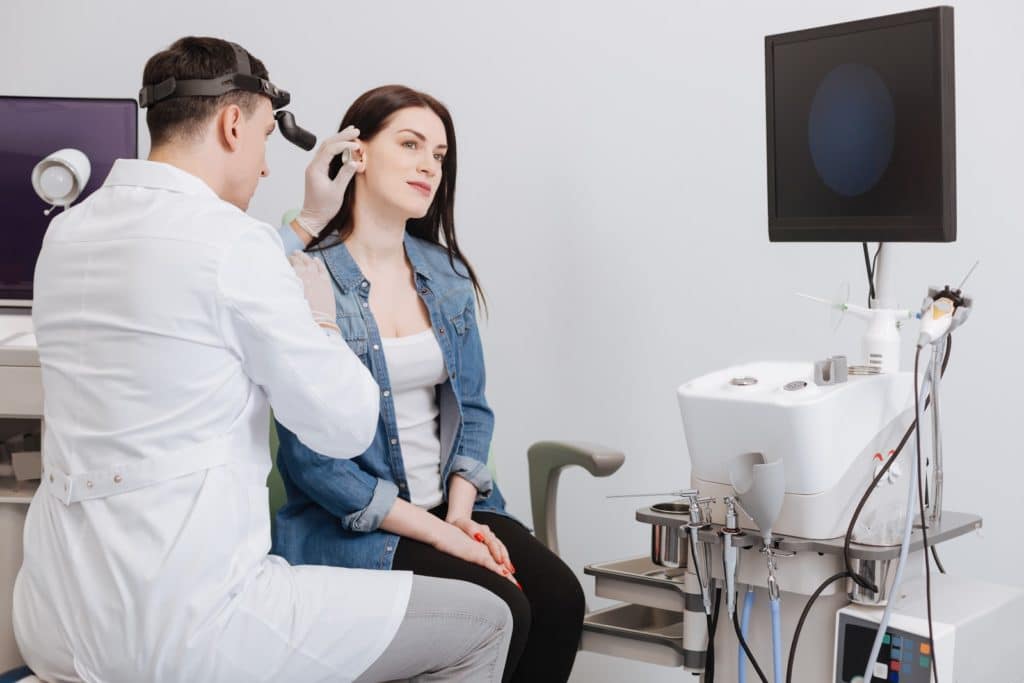
If it is your first time visiting an ENT, how will this appointment differ compared to appointments you’ve attended with other doctors? Regardless of the specialist you are seeing, there are many similarities in the way the healthcare system works. At Collin County Ear, Nose, and Throat, we want to be sure you are comfortable during your appointment. So, we provide detailed information to give you an overview of what to expect when you come to our office for an exam or treatment.
Preparing to Visit an ENT
Here is an overview of what might happen before, during, and after your appointment with an ENT:
- Referral for Appointment: In many cases, medical treatment begins with care from a general physician. If it is determined that a specialist is needed, then you receive a referral to another doctor in the area, such as an ENT. When you contact our office for an appointment, be prepared with this referral information (if applicable), as well as your insurance details. We will book an exam to match your schedule.
- Paperwork and Insurance: It’s no surprise that you will have paperwork to fill out before your appointment. We recommend that you arrive at our office with an extra 10-15 minutes to spare so you have time to complete the new patient paperwork. Additionally, please bring your insurance card so we can keep this information on file.
- Medications: If you are already taking a prescription or you regularly use over-the-counter medications, we recommend that you bring them to the appointment. Either bring the bottles or make a list that includes the names of the medications as well as dosage amount and frequency. This information is essential to help the doctor determine if other prescriptions are needed or how your current medication use might be affecting your symptoms.
What to Expect at the First Appointment
Here is an overview of what will happen during your first ENT appointment:
- Exam and Conversation: When it is time to meet with the ENT, you will be visiting in a private examination room. The doctor will ask about your detailed medical history. Be sure to provide full details about your health, including the reason for the visit, the timeline of your symptoms, and any other applicable information that might be related. Next, a physical examination will be completed. This exam varies depending on your symptoms but might include a look at your ears, nose, and throat. Special instruments are used to see inside the nasal passages and/or ears. These examination tools will not hurt, they are used so the doctor can see into the hard-to-reach areas of your head.
- Ask Questions: It is smart to come to your appointment prepared with questions. If you are unsure about something, then a conversation with a doctor is a more reliable source than a search online. You might consider writing your questions and symptoms in advance so you don’t overlook anything during the appointment. Referring to your notes ensures that you don’t forget to talk to the doctor about the most important details when you are in the office.
- Treatment Plan: The initial examination will provide the information needed to determine the best way to move forward. Your ENT might recommend additional testing, medication, or other equipment that needs to be used to look more closely at your nose and sinuses.
Additional Testing in an ENT Office
The doctor can gather important details during your exam, which might indicate that more information is needed. For example, it might be recommended that a nasal endoscope is used (a lighted, thin camera). This equipment can be inserted through your nostrils to see the inner areas of the sinuses to determine the level of inflammation or possible abnormalities that are contributing to your symptoms.
Another possibility is that a CT scan could be recommended. At Collin County Ear, Nose, and Throat, we offer in-office CT scanning. Our team provides a comfortable environment for digital scanning of the sinuses, without the need to visit a hospital.
We also offer hearing tests if needed. The results of this testing will help the doctor determine if treatments are needed to optimize your hearing.
Personalized Treatment Plan
The testing and exams are designed so the doctor can identify the specific diagnosis affecting your condition. After all of the necessary, applicable information is gathered, then your ENT will provide recommendations for treatment.
Usually, we start with minimally-invasive options first. For example, you might try a prescription medication and/or lifestyle changes to see if it helps clear up the problem. If these initial treatments don’t work, then you might need to visit for a follow-up appointment to discuss other services.
Certain health conditions can only be treated with surgical methods. If surgery is needed, we can complete many of these procedures in our office. Our staff will explain what you can expect before, during, and after the treatment. Then, we will schedule an appointment for you to come back for the services that are needed.
Your Health is Our Priority
What makes Collin County Ear, Nose, and Throat stand out in the local industry? We maintain the highest standards when it comes to the quality of care offered for every patient. Not only do we provide top-notch technology, but our staff is highly trained in the industry.
We take the time to listen to your needs and evaluate your health concerns. Our goal is to provide a comfortable environment where you can access excellent services based on your individual treatment plan.
We promise a full-service experience when you visit Collin County Ear, Nose, and Throat. If you live near Dallas, Denton, or Collin Counties, then you are welcome to contact us to schedule an appointment. Two nearby offices are available for your convenience, in Frisco and Plano, TX.
Our website form is a quick and easy way to request an appointment, or you can always call us at (972) 596-4005.